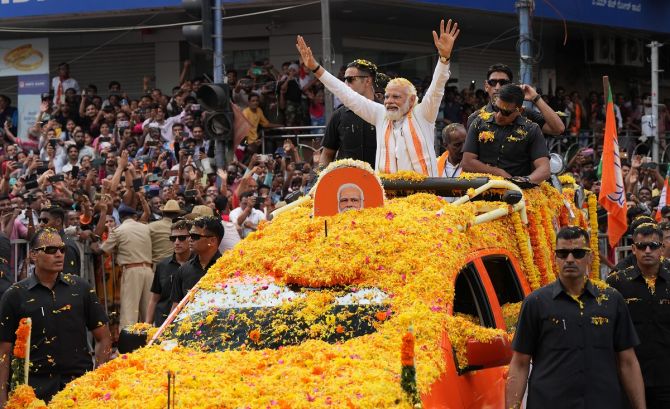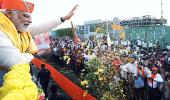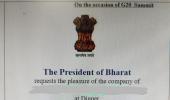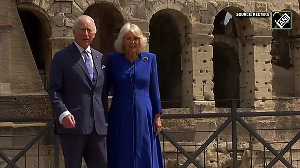'This means the remedy will be worse than the disease. The thing which you want to avoid will happen.'

Constitutional expert P D T Achary -- former secretary general of the Lok Sabha -- discusses with Prasanna D Zore/Rediff.com what a special session of Parliament between September 18 and September 22 could entail, why one nation, one election is a funny suggestion and what amendment would need to be made to change the name of our country from India to Bharat.
"The point, however, is that holding elections at different times have not caused any irreparable loss or led to any political crises anytime," says Achary.
How feasible could it be to enact one nation, one election idea in a vast country like India with such huge diversities and 28 states and eight Union territories?
It's an impractical idea at this stage. Of course, we used to hold simultaneous elections to Parliament and assemblies in the '50s and '60s, but towards the end of the '60s the cycle got broken because of early dissolution of the Lok Sabha.
Then some state governments in the north fell because of political instability and their assemblies were dissolved. The whole cycle was broken, the pattern changed.
After that elections were held at different times. Now, to hold the elections to the (state legislative) assemblies and Parliament together is not possible because when Parliamentary election is to be held, then all the assemblies will have to be dissolved (for us to have one nation, one election).
As of today, the terms of the state legislative assemblies and Parliament are not co-terminus.
Since they (the state assemblies) were constituted at different times their terms also end at different times.
Elections can be held only towards the end of their tenure. It is not possible to dissolve all the assemblies because that will create constitutional problems.
Dissolving an assembly is the prerogative of the state government. The Constitution says the governor shall dissolve the assembly, but the governor dissolves the assembly on the advice of the council of ministers.
The governor cannot act on her/his own. s/he can act only on the advice of the council of ministers. So it is the prerogative of the council of ministers to decide whether they should dissolve the assembly and go for elections; that freedom is given to them by the Constitution.
The Union government can step in and dissolve the assembly only when there is a breakdown of the Constitutional machinery. And then under Article 356 the President will step in and take over the administration of the state and dissolve the assembly. That is the only situation in which the Centre can intervene.
Of course, it is an encroachment of the federal structure, the federal principles, but then the Constitution makers put in a provision there. At that time Dr (B R) Ambedkar (the chairman of the Constituent Assembly that framed India's Constitution) had said that it is just a provision, it is not to be invoked and I hope it will never be invoked. This was the hope.
But contrary to his hope, so many times it has been used or misused or whatever. The point is that you cannot dissolve all the 28 state assemblies because you are going to hold elections to Parliament and you want all the elections to be held together because you will be saving a lot of money which will help the government do a lot of developmental work using the money that would be otherwise wasted (in holding assembly elections at different times).
These kinds of arguments are neither here nor there.
The Union government cannot direct the state governments to dissolve all the assemblies. They cannot give a direction to the state governments under Article 256 or 257.
If they bring a Constitutional Amendment to that effect, that Constitutional amendment will be encroaching upon federalism and violating the basic structure because federalism is a part of the basic structure and Parliament cannot make a law which will violate the basic structure.
Would amending the Constitution to hold one election across India require ratification by one-half or two-third of the state assemblies?
Such ratification is required only under certain conditions or situations. For holding simultaneous elections for all the state assemblies and Parliament will not require such special one-half or two-third ratification by state assemblies.
I don't think that is an issue which is mentioned in Article 368, where it's states that ratification by 50 per cent of the states is required. This may not be one issue.
It will all depend on the proposal that comes from the government.
Knowing these challenges, knowing these difficulties, why would the government float such a proposal?
Has the time come for such an eventuality in India that we need to have simultaneous elections to the Lok Sabha and state assemblies?
I do not know. I can make a guess.
The whole problem is that prime minister was virtually on the road too many times (addressing election rallies). He was too much involved in all the elections starting from the panchayat to municipality to assembly to Parliament elections. He becomes the principal campaigner of the BJP.
A prime minister can't do that because he doesn't have such so much time to spare for such election campaigns. Somehow that is what has been happening. Naturally, at some time the prime minister must have felt that there is too much pressure on his time.
Therefore he must have thought that it would be better to hold all the elections simultaneously.
In the '50s and '60s elections were held to the assemblies and Parliament together, but now they are actually thinking that they will cover the elections to the municipality and panchayats also.
The point, however, is that holding elections at different times have not caused any irreparable loss or led to any political crises anytime.
One argument (in favour of one nation, one election) is that the government cannot take any decisions once the Election Commission announces the Model Code of Conduct. When the Model Code of Conduct is in force the government can't take any decisions (regarding development projects in a state that goes to election) and so on. But the model code of conduct remains in force for one month during the election only.
But I don't think that has in any way hobbled any government at any time.

The other argument is that in a state like West Bengal in 2022, the Election Commission had to announce elections in seven-eight phases and if that is the case then how can the Election Commission hold simultaneous polls to the 29 assemblies and Parliament on a given day or over say a period of one-two months?
It is not possible. The point is that elections to all the assemblies will be announced on one day, but election dates will be different.
In some states it could be staggered (like in West Bengal in 2022), and in some states it will be completed in one day.
If this idea is to be implemented on the ground, then all the assemblies will have to be dissolved first. After dissolving all the assemblies the election schedule will be announced for all the states; that means the dates on which the poll will be conducted.
In some states it may be three days or four days. In some states it may be one day.
But will elections take place together on the same day or within a month or two? Wouldn't such a colossal exercise require time to work out the logistics of security, election personnel, EVM machines?
Such details are not available yet.
Actually, what exactly they (the government and BJP) have in mind is not known to us. The committee has been set up and committee has to go into this. And then they have to make up their mind after talking to all the stakeholders.
We have no details. No paper has been circulated by anybody except perhaps that Law Commission's recommendation.
In 2018, the Law Commission suggested that all the elections should be held or can be held together. Then they said, suppose an assembly has completed only two years and then the Parliament election is to be held then the assembly will be dissolved and the election will be held to that assembly for the remaining period.
One nation, one election is a very funny suggestion. That means there will be frequent elections. This means the remedy will be worse than the disease. The thing which you want to avoid will happen. One assembly within two years can have two elections. That kind of a thing cannot happen.
What could be the major challenges for implementation of such kind of an election in India? Would it be Constitutional, logistical challenges?
The real challenge is actually Constitutional. There cannot be A logistical problem because it was a practice in the '50s and '60s.
Now the problem is that the whole cycle was broken and now it is practically impossible to hold elections together.
The Constitutional issue is all the assemblies will have to be dissolved and assemblies cannot be dissolved on the whims and fancies of the Union government. The Government of India cannot give such a direction.
Suppose they are bringing in an amendment to the Constitution and say that the central government can dissolve the assemblies which will be a direct attack on India's federalism and on the credibility of basic structure of the Constitution. It will be struck down by the Supreme Court.
Nobody is clear in his mind about how it can be implemented on the ground.
What do you make of this government's decision to hold a Parliament session from September 18 to 22? Is it sudden or is the government likely to bring a notification or an amendment to rename India as Bharat in this five-day Parliament session?
I don't know. Actually, nobody is prepared to hazard a guess as obviously there is no purpose that will be solved by having a special session during this time for five days.
The last Parliament session (the monsoon session) ended just two weeks ago without doing much business. In another month or two you will have the winter session.
What has happened in between to necessitate such a special session and why it is being done in such a hole and corner way?
A Parliament session, after all, is a public event and the whole public will know what exactly is going to be discussed in Parliament. Deciding the business of Parliament is not a secret issue unless it is a secret session.
Everything will be well known. For example, if the House is to be convened on the 18th (of September), then a day or two before this the whole business will have to be disclosed to the people, to the members and then after that there is no secrecy.
What is the benefit you will get by keeping it a secret till September 16? That is one thing which I don't understand.
In your opinion, sir, there is no major benefit that one nation, one election could achieve for India?
I don't think so. I don't see any kind of benefit.
In fact, I would say that holding elections at different times helps the government, because the government will know what way the people think and what they feel about a government, and then the government will get an opportunity to course correct.
Otherwise, if you face the election after five years, you will not know what the people have felt about you during whole of these five years.
Here (under the present regime), after two years or three years, you will get to know what the people feel about you.
If you have taken some steps which the people didn't like, you get to know. And you can take the necessary course correction in the meantime and that will benefit the government.
This question may seem a bit far-fetched, but could a national emergency be proclaimed during such a session?
You don't have to convene a Parliamentary session for declaring an Emergency. That is the prerogative of the State. They can take a decision and impose an Emergency and get it ratified by parliament.
You don't have to declare the Emergency in Parliament.
Is there a provision in the Constitution that provides for changing the country's name if and when the Executive feel so?
No. It can be done by bringing in an amendment to the Constitution in Parliament and if Parliament votes for it then the name changes.
The amendment can be made under Article 1, which says that India, that is Bharat, is a Union of States. That will have to go and replaced with India, from hereafter, will be known as Bharat.
Can such an amendment be made during a special session and will such amendment need ratification by one-half or two-third of India's states?
That is not required. Once Parliament votes for such an amendment, it can be sent to the President of India for her consent after which it becomes formal.
What happens to all those documents that establish the identity of Indian citizens that has India written on it?
All this will change in course of time. A cut-off date could be announced within which all these documents will have these changes.
These documents will all have to replace India with Bharat and this can happen over a period of time once India is officially renamed Bharat.
How smoothly can that process happen given India's vast population?
It will certainly take time, but it will be done.











 © 2025
© 2025